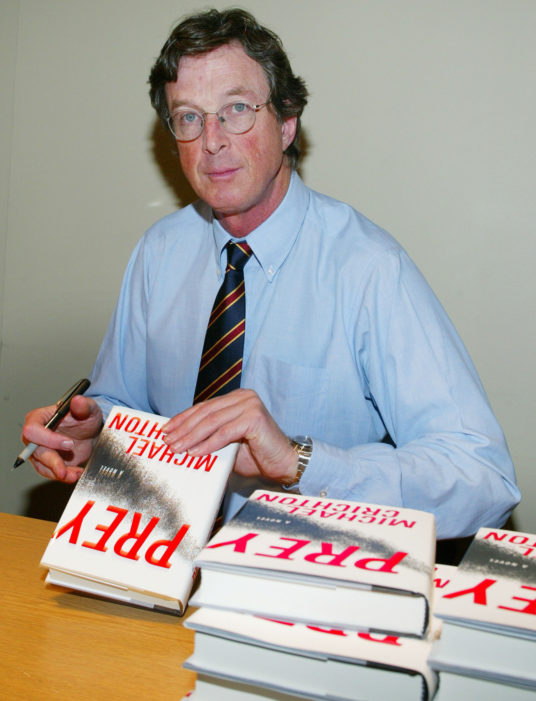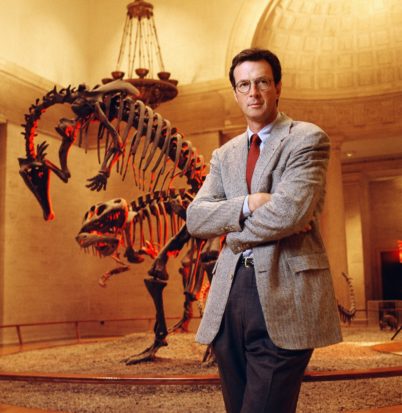Here’s an author I’ve had my differences with over the years: the brilliant but erratic Michael Crichton, who on November 4, 2008 passed away at age 66 after a long battle with cancer. I’m sorry to see him go, as he was an imaginative, trailblazing writer without question, but…
First, the good stuff. Crichton was the author of classic novels like THE ANDROMEDA STRAIN, THE TERMINAL MAN, EATERS OF THE DEAD and JURASSIC PARK, among many others. He was also a trained doctor, world traveler, anthropologist and sometime movie director; films Crichton helmed include COMA, the classic WESTWORLD, the Tom Selleck sci-fier RUNAWAY, and the suspensor PHYSICAL EVIDENCE. Plus he created ER.
The man possessed a wealth of knowledge and experience few of us could hope to match. In his 1996 memoir MONSTER: MAKING A LIVING OFF THE BIG SCREEN, the late John Gregory Dunne identifies Crichton as the guy he calls when he needs info about…anything. Most of Crichton’s novels begin with learned dissertations on the real-life particulars of his subject matter, which includes mind control, bio-terror and cloning, all coined before such concepts become popular.
He was also a damn good writer. THE ANDROMEDA STRAIN was terrific brainy entertainment, and JURASSIC PARK was even better. The Viking adventure story EATERS OF THE DEAD was based on an actual thousand-year-old document, and the resulting novel was extremely skillfully rendered, blurring fact and fiction with remarkable acuity.
True, I found Crichton’s 1972 novel THE TERMINAL MAN, an ersatz thriller about a man with electrode brain implants who embarks on a killing rampage, to be agonizingly dull and unthrilling, but damned if I didn’t breeze through it in half a day. Even 1992’s ludicrous RISING SUN, a paranoid right wing rant in the guise of a mystery-thriller about the imminent Japanese takeover of the west (we all know how that went down), was quite absorbing…even though it is total nonsense.
The latter novel brings up the main issue I have with Crichton. The fact is that despite his knowledge and talent he became increasingly cranky and closed-minded during the last couple decades. That’s something none of the recent laudatory obituaries have mentioned, concentrating instead on his “inspiration to students of all ages,” and how he “challenged scientists in many fields, and illuminated the mysteries of the world in a way we could all understand.”
I really hate to speak ill of the dead, but I believe Crichton in his later years did more harm than good, and perpetrated an overabundance of bad fiction. Take his 1994 novel DISCLOSURE, which was even more ludicrous than RISING SUN.
Written in the wake of the Clarence Thomas-Anita Hill sexual harassment case, DISCLOSURE was about a man seduced by his female boss who then sues him for sexual harassment. Crichton’s apparently shocking thesis was that women are just as capable of harassment as men, although I believe the problem of good-looking female executives coming on to men isn’t something most of us will ever have to worry about. The novel, like RISING SUN before it, barley works as a thriller, and even less so as a ham-fisted political harangue (although I must admit I found the glitzy Gary Levinson helmed 1994 movie adaptation to be great fun).
Most writers have their off days, but for a mind as brilliant as Crichton’s to focus so intently on such nonsense is downright aggravating. I stopped reading his books after DISCLOSURE, although I hear tell the news wasn’t all bad. Crichton’s 1999 time travel themed novel TIMELINE is, according to people I know who’ve read it, an enjoyable, crisply written trip back to the Middle Ages that’s far removed from the lousy Dick Donner flick made from it, while 2003’s PREY is said to bring back the magic of JURASSIC PARK in its tale of nanotechnology run amuck.
But Crichton’s most offensive project was his second to last novel: 2004’s anti-global warming tract STATE OF FEAR, in which Crichton vociferously attacked environmentalists. He provided plenty of documentation for his attacks, though apparently only that which supported his thesis—from one review: “Crichton’s skewed reading of the scientific literature leads him into an utter abandonment of literary verisimilitude.”
Crichton no doubt did his homework. His book was beloved by Republican congressman James M. Inhofe, who called Crichton to testify before congress about Washington’s environmental policy (unsurprisingly, he felt it should be curtailed). Nonetheless, I say Crichton is wrong here.
Others feel the same way, as STATE OF FEAR was widely denounced by scientists. Here’s a quote from the Natural Resources Defense Council: “Hundreds of scientists—including from the National Academy of Sciences, the American Geophysical Union and the Intergovernmental Panel on Climate Change—have spent years considering the very challenges raised in Crichton’s book in the process of coming to a consensus that global warming is underway and caused by humans.” Here’s another quote, this one from NASA research scientist James Hansen: “Crichton writes fiction and seems to make things up as he goes along. He doesn’t seem to have the foggiest notion about the science he writes about.”
It’s interesting to note that despite the denials of Crichton and others, the dire predictions of most environmentalists appear to be coming true. The NRDC  again: “Expert concerns about global warming are growing steadily, as more and more evidence pours in supporting the conclusion that heat-trapping pollution—from fossil fuels and other sources—is warming the planet at an unprecedented rate.” I’ll take the argument even farther: it’s a fact that many cancers are due to environmental factors, meaning Crichton’s life could possibly have been saved had he listened more closely to environmentalists!
again: “Expert concerns about global warming are growing steadily, as more and more evidence pours in supporting the conclusion that heat-trapping pollution—from fossil fuels and other sources—is warming the planet at an unprecedented rate.” I’ll take the argument even farther: it’s a fact that many cancers are due to environmental factors, meaning Crichton’s life could possibly have been saved had he listened more closely to environmentalists!
STATE OF FEAR was also guilty of a very bad habit Crichton developed in his final years: creating thinly veiled fictional portrayals of actual people he disagreed with and casting them as villains. Quite a few real life environmental figures are referenced in the novel, while in Crichton’s final book NEXT (which is said to make STATE OF FEAR look like WAR AND PEACE quality-wise) one of his critics is fictionalized as a child molester. Classy!
I know many of you are going to argue that I focus overmuch on Crichton’s final novels and not nearly enough on his earlier, better ones. Perhaps. But the bottom line is that THE ANDROMEDA STRAIN, EATERS OF THE DEAD and JURASSIC PARK remain impacting works, but so do RISING SUN, DISCLOSURE and STATE OF FEAR, for better or (I think) worse.

